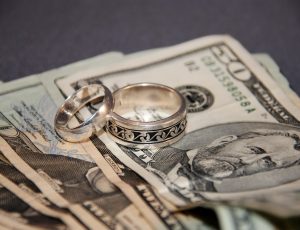One of the most common questions I get asked by both friends and clients who are considering filing for divorce or who have already started the process is, “What is this going to cost me?” It makes sense of course. People want to know what they are going to get and what they are going to lose. What will they get to keep and what will they have to share, or conversely, what will their spouse get to keep and what will their spouse have to share with them? Unfortunately, as simple as this question may sound, the answer is never that simple. There are many variables that can affect the answer.
The law and attorneys use a term many people have probably heard – Equitable Distribution. What I have come to learn over the years is that there are some common misperceptions where equitable distribution is concerned. Most common is the belief that equitable distribution means equal distribution – the idea that every asset, every debt, everything, is split in half. But equitable distribution does not mean equal, it means equitable or fair. Another common misperception related to the first one is the belief that if an asset predates the marriage, it absolutely is not eligible for equitable distribution. As simple and clean as this may seem, the reality of equitable distribution is almost never that simple.
What is fair is dependent on many factors including the financial position of each party and the types of assets and debts that are involved. There are many considerations that go into determining which assets will be subject to equitable distribution and how those assets will be valued and divided. For example, are there investment and retirement accounts (e.g., brokerage accounts, pensions, IRAs, etc)? If so, were those accounts opened prior to or during the marriage? And if they were acquired prior to the marriage, did the holder of the account continue to invest money into the account even after they were married, thereby contributing marital funds into a previously premarital account? Although such accounts are generally passive assets in that they change the value without any action on the part of the holder, they can also have an active element if a holder continues to put money into the account. And if the holder does continue to put money into an investment account after marrying, then part, but not all, of that asset has become marital.
Another example is real property. Often people believe that if they own a home or a piece of property prior to getting married, it is premarital and thus not subject to equitable distribution. While this is true in some instances, it is not always the case. Did the parties use the home as the marital residence? Did the other spouse care for the house? Were there any renovations or improvements during the marriage that were overseen by the other spouse and/or paid for with marital funds? Was there a mortgage that was paid down after the marriage using marital funds? All these questions become relevant in determining whether a previously exempt piece of property is now subject, at least in part, to equitable distribution.
The fact-sensitive nature of equitable distribution inquiries means no case is exactly the same. The more assets and/or debts involved, the more complex they become. And even a seemingly straightforward case can be more complicated than it appears on first impression as there is no way of knowing what hiccups you might encounter along the way. At Yudes Family Law, we have extensive experience in navigating our clients through the often choppy waters of equitable distribution. We know how difficult and complicated this process can be and the law firm of Yudes Family Law is here to help you.
 New Jersey Divorce and Family Lawyer Blog
New Jersey Divorce and Family Lawyer Blog

